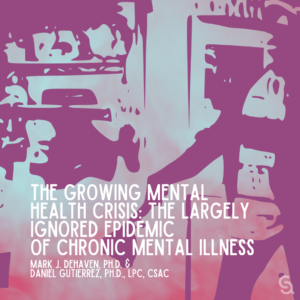 (Editor’s note: This is Part 3 of a 4-part health care series we are running over the next few months. You can access Part 1 on poverty, social factors, and health inequalities here; Part 2 on how the U.S. healthcare system discriminates again the poor here, and Part 4 on health, communities, and the role of the church here.
(Editor’s note: This is Part 3 of a 4-part health care series we are running over the next few months. You can access Part 1 on poverty, social factors, and health inequalities here; Part 2 on how the U.S. healthcare system discriminates again the poor here, and Part 4 on health, communities, and the role of the church here.
In the past two months, thousands of federal workers have been abruptly uprooted from their lives—fired without notice, publicly criticized by leaders, and mocked on social media as lazy or wasteful. The new Director of the White House Office of Budget Management even stated he wants federal workers to feel “traumatized.” Unsurprisingly, many report debilitating stress, suicidal ideation, personal crises, weight loss, insomnia, panic attacks, and complete mental breakdowns.(1)
I (DG) have been a psychotherapist for 15 years—long enough to become attuned to the rhythms of a typical therapy session. I know the cadence of depression, anxiety, and addiction. I recognize the thudding of my own heart as I lean in to hear a client’s story of trauma. I’m familiar with the quiet moments of reflection, the occasional tears, and the sharp inhale that marks an emotional breakthrough. But lately, something has changed. The sounds are quieter, heavier. Clients still speak of their struggles, but now their words are blanketed by a deeper despair. Grief feels accelerated. More often than not, they carry with them a dangerous absence of hope.
Policies designed to “traumatize” others violate every principle of decency, compassion, and justice. They create climates of fear and retribution, rooted in “othering”—making people feel isolated, threatened, and vulnerable. We’ve seen such policies aimed at immigrants, trans individuals, and now, federal workers. This kind of intimidation and persecution is a call to action for Christians. We are commanded to “bear one another’s burdens” (Galatians 6:2) and to follow the example of the Good Samaritan by showing mercy and compassion to those in need (Luke 10:25–36).
Mental Health Disorders: A Growing Epidemic
This trauma is unfolding during a time when most Americans are already experiencing heightened stress, and mental health conditions are at record highs. Each year, 25% of adults suffer from a diagnosed or undiagnosed mental health disorder. By comparison, heart disease—the leading cause of death—affects just 5–6%. Up to 60 million Americans suffer from conditions such as depression, anxiety, bipolar disorder, schizophrenia, and PTSD. These illnesses impact their thoughts, emotions, and behaviors, often making daily life unmanageable by disrupting relationships, work, and basic self-care.
Over the past decade, anxiety—defined as persistent worry or fear about everyday situations—has escalated rapidly, rising from 11% in 2019 to 40% in 2020. By 2024, 43% of Americans reported feeling more anxious than the year before. Depression is also on the rise. Women are twice as likely as men to experience it, and young adults now face unprecedented levels of anxiety and sadness.
While health and longevity improve in other wealthy nations, the opposite is true in the U.S. Deaths of despair—suicide, drug overdoses, and alcohol-related illnesses—are rising here, even as they decline globally.(2) Fueled by the fentanyl epidemic, over 109,000 Americans died from drug overdoses in 2022, and 51,000 died from alcohol-related causes—a 70% increase in just 10 years. Suicide is a growing public health crisis, especially among youth. It is now the second leading cause of death for children aged 10–14 and young adults aged 25–34. Over the past decade, suicide rates increased 56% among 10–24-year-olds, contributing to the U.S. having the highest pediatric death rate among wealthy countries.(3,4)
Poor mental health often comes hand-in-hand with isolation and a lack of meaningful social connection. Over 30% of Americans describe themselves as “seriously lonely.”(5) The burden is even greater for LGBTQ+ individuals and people from marginalized communities, who face daily political attacks, stigma, and shame. LGBTQ+ youth, in particular, are more likely to be estranged from family and struggle with suicidal thoughts.
Treatment—and the lack thereof
Despite growing need, access to mental health care remains dangerously inadequate. Only about half of those who need help receive treatment. Among the 48 million people aged 12 and older with substance use disorders, only 10% get care.(6) Recent federal funding cuts to the Substance Abuse and Mental Health Services Administration (SAMHSA), the Centers for Disease Control and Prevention (CDC), and the National Institutes of Health (NIH) threaten to reverse gains made in prevention and early intervention.
A few years ago, John Oliver dedicated an episode of his show to the mental health crisis. In his characteristically brilliant (and biting) tone, he concluded:
“Look, in the past, so much of the problem here is that people would not ask for help. But, thankfully, now that is less of an issue… But when people do reach out for help, we are just not able to give it to them. If we truly want to be a society that values mental health, we need to be a society that values mental health care—and that means supporting the people who deliver it.”(7)
Research supports this. The Kaiser Family Foundation reports that nearly 50% of the U.S. population lives in a mental health workforce shortage area.(8) By 2037, we’re projected to face alarming shortfalls:
-
113,930 addiction counselors (meeting only 45% of demand)
-
43,660 adult psychiatrists (43%)
-
6,780 child and adolescent psychiatrists (65%)
-
87,840 mental health counselors (57%)
-
79,160 psychologists (55%)(9)
Over one-third of clinicians leave the profession, citing poor compensation and burnout.
Moving forward: A role for Christians and congregations
Behind every statistic is a person caught in a storm of despair—a life marked by struggle, a family facing heartbreak, a community searching for hope.
Christians cannot meet this crisis with silence. Yet, for many, that’s exactly what they’ll receive—even from their congregations. Their pain is dismissed, their stories unheard. In place of compassion, they may encounter oversimplified solutions or harmful, anti-scientific rhetoric that further alienates them.
But it doesn’t have to be this way. Excellent resources already exist to help congregations respond well to mental health needs, including:
-
Mental Health: A Guide for Faith Leaders by the American Psychiatric Association (psychiatry.org)
-
Interfaith Network on Mental Illness video series (inmi.us)
-
Pathways to Promise Mental Health Ministries (pathways2promise.org)(10)
Ministering to one another within the church is essential—but it’s not enough. Christians also bear a broader responsibility to care for the vulnerable. The biblical mandate is clear: extend mercy, pursue justice, and love the “other.” In Matthew 25:31–43, Jesus calls us to care for the hungry, the sick, the stranger. In Matthew 7:12, He reminds us: “So in everything, do to others what you would have them do to you.”
We’ve heard much political posturing about mandates in recent years. But Christians already have one:
“To act justly and to love mercy and to walk humbly with your God.” (Micah 6:8)
References
1. Korecki N. ‘You lose all hope’: Federal workers gripped b mental health distress amid Trump cuts. NBC News. March 9, 2025.
2. Sterling P, Platt ML. Why Deaths of Despair Are Increasing in the US and Not Other Industrial Nations—Insights From Neuroscience and Anthropology. JAMA Psychiatry. 2022;79(4):368–374. doi:10.1001/jamapsychiatry.2021.4209
3. Centers for Disease Control and Prevention, Web-based Injury Statistics Query and Reporting System (WISQARS). 12 Leading Causes of Death, United States, 2022.
4. Woolf SH, Chapman DA. Excess US Deaths Attributable to High All-Cause Mortality Rates Among Youths Aged 0 to 19 Years. JAMA Pediatr. 2024;178(9):942–944. doi:10.1001/jamapediatrics.2024.1869
5. Bruss KV, Seth P, and Zhao G. Loneliness, Lack of Social and Emotional Support, and Mental Health Issues — United States, 2022. Morbidity and Mortality Weekly Report (MMWR), 2024, 73(24);539–545
6. Saunders H. A Look at Substance Use Disorders (SUD) Among Medicaid Enrollees. Kaiser Family Foundation. Feb 17, 2023.
7. Oliver J. Mental health care: Last week tonight with John Oliver. August 1, 2022. YouTube video. Accessed March 12, 2025.
8. Kaiser Family Foundation. Mental Health Care Health Professional Shortage Areas (HPSAs). December 31, 2024. Accessed March 12, 2025.
9. National Center for Health Workforce Projections. Projected supply and demand of health care workers through 2037. Data.HRSA.gov. Accessed March 13, 2025.
10. Ramsey-Lucas C. The Necessity of a Mental Health Ministry. Sojourners. April 22, 2019 (https://sojo.net/articles/necessity-mental-health-ministry).
 Dr. Mark J. DeHaven is a Distinguished Professor Emeritus of Public Health Sciences at UNC Charlotte. A leader in community medicine, his NIH- and CDC-funded research has improved health outcomes in underserved populations. Previously, he founded community medicine and community health science divisions at UT Southwestern Medical Center at Dallas. Recognized globally, he helped develop sustainable health models in the U.S., Mexico, Peru, and China, bridging research and real-world impact.
Dr. Mark J. DeHaven is a Distinguished Professor Emeritus of Public Health Sciences at UNC Charlotte. A leader in community medicine, his NIH- and CDC-funded research has improved health outcomes in underserved populations. Previously, he founded community medicine and community health science divisions at UT Southwestern Medical Center at Dallas. Recognized globally, he helped develop sustainable health models in the U.S., Mexico, Peru, and China, bridging research and real-world impact.
 Daniel Gutierrez, Ph.D., LPC, CSAC will co-author the segment on mental health. He is a Professor, Counseling and Special Education, Virginia Commonwealth University. Daniel has dedicated his career to better understandig the factors and pathways by which historically marginalized, vulnerable, and at-risk individuals thrive in response to chronic stress, systemic injustices and life challenges, for the purpose of helping develop a more just, healthy, hopeful and flourishing society.
Daniel Gutierrez, Ph.D., LPC, CSAC will co-author the segment on mental health. He is a Professor, Counseling and Special Education, Virginia Commonwealth University. Daniel has dedicated his career to better understandig the factors and pathways by which historically marginalized, vulnerable, and at-risk individuals thrive in response to chronic stress, systemic injustices and life challenges, for the purpose of helping develop a more just, healthy, hopeful and flourishing society.


